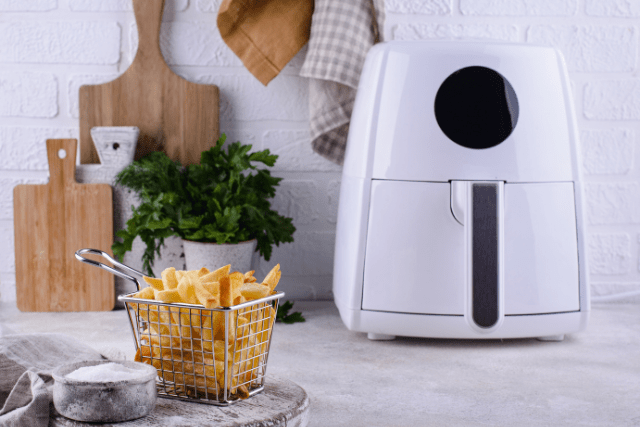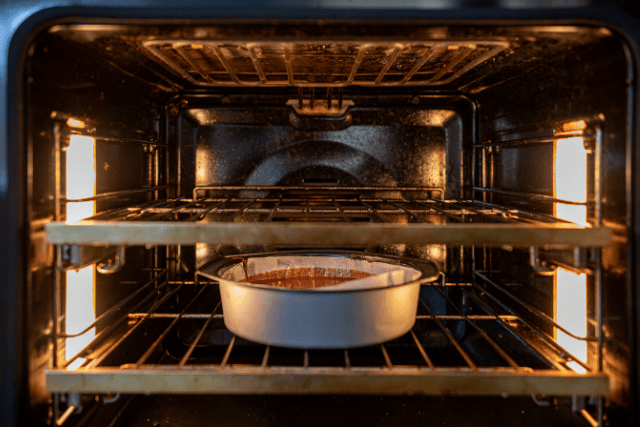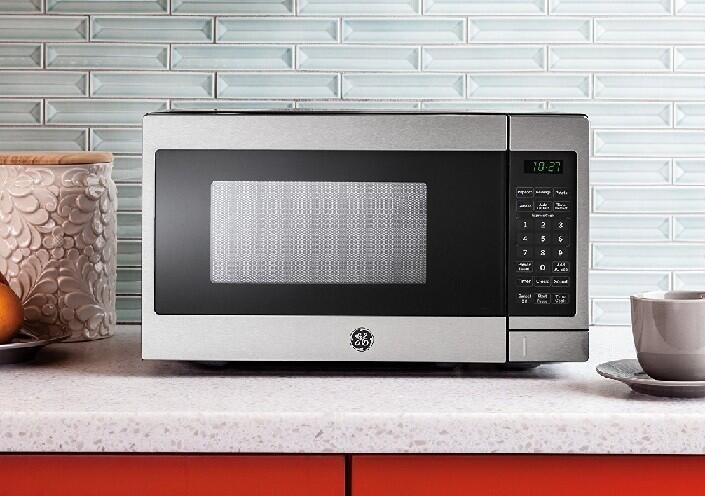Are you tired of spending endless hours cleaning your air fryer or, even worse, dealing with greasy residue on your food? Look no further! This blog post guides you through 10 simple steps to clean and maintain your air fryer like a pro.
Not only will these tips ensure that every meal is cooked to perfection, but they’ll also prolong the lifespan of your appliance and enhance its overall performance.
Key Takeaways
- Regularly cleaning and maintaining your air fryer is essential for food safety, prolonging the appliance’s lifespan, and ensuring optimal performance.
- Simple steps to clean and maintain an air fryer include disassembling and soaking components in soapy water, wiping the interior and exterior with a damp cloth, cleaning the heating element gently, reassembling after thorough drying, and adequately storing.
- For a deeper cleaning of an air fryer, try using natural solutions like vinegar – baking soda paste, or lemon juice. Specialized air fryer cleaning products can also be effective, but you should always follow manufacturer instructions to avoid damage to the appliance.
- Using dish soap on most parts of an air fryer is safe but never put it in a dishwasher. Choose oils with high smoke points, like avocado or vegetable oil, when cooking with an air fryer to prevent smoking during use.
Importance Of Cleaning And Maintaining Your Air Fryer
Cleaning and maintaining your air fryer is essential for ensuring food safety, prolonging the appliance’s lifespan, and maintaining optimal performance.
Ensuring Food Safety
Ensuring food safety is a top priority for anyone preparing meals in their kitchen, and the air fryer is no exception. Proper cleaning and maintenance of your air fryer significantly minimize the risk of harmful bacteria growth or cross-contamination from cooked to uncooked foods.
Additionally, maintaining a clean air fryer helps reduce unpleasant odors and off-flavors that could affect the taste of your dishes. Following proper cleaning procedures with each use, such as washing the basket and tray with hot soapy water, you can serve delicious meals to friends and family without worrying about compromising their health due to an improperly maintained appliance.
Prolonging The Lifespan Of Your Appliance
Regular cleaning and maintenance of your air fryer can help prolong its lifespan and save you money in the long run. Neglecting to clean your appliance can cause food particles or grease to accumulate, damaging the heating element or other internal components over time.
Maintaining Optimal Performance
Regular maintenance of your air fryer is crucial in maintaining its optimal performance. Neglecting to clean and maintain your appliance can lead to a buildup of grease, food particles, and carbon residue that can affect the quality of your meals.
A dirty air fryer may also cause uneven cooking or smoking during use, which can be hazardous.
For example, regularly wiping down the heating element with a damp cloth will prevent grease from accumulating and affecting its efficiency. Moreover, disassembling the components after each use and soaking them in soapy water will remove any stubborn stains or debris that may have been missed during wiping down.
Also Read: Best Air Fryers in India
10 Simple Steps To Clean And Maintain Your Air Fryer
After unplugging and allowing the air fryer to cool down, disassemble it by removing the food tray and basket, soaking them in soapy water, wiping down the interior, cleaning the heating element, reassembling, and performing regular maintenance for optimal performance.
Unplug And Cool Down The Appliance
The first step to cleaning and maintaining your air fryer is to unplug it and let it cool down completely. This step is crucial for safety as you don’t want to risk burns or electrical shock while handling the appliance.
Once the air fryer has cooled down, you can disassemble it and wash each part with hot soapy water. It’s essential to ensure that all components are thoroughly cleaned before reassembling them, ensuring optimal machine performance.
Disassemble And Soak Components In Soapy Water
To thoroughly clean an air fryer, it is essential to disassemble and soak its components in soapy water. This step involves removing the food tray and basket from the air fryer and washing them with hot soapy water.
Soaking the parts in warm soapy water for 30-60 minutes is recommended for tough stains or grease buildup. It’s important to note that steel wool, metal scrubbers, or abrasive sponges should not be used to clean an air fryer as they can damage the non-stick coating.
Instead, a soft sponge or cloth can be used to wipe down these components after soaking them in soapy water.
Wipe Down The Interior And Exterior
After disassembling and soaking the components of your air fryer in soapy water, it’s time to wipe down its interior and exterior. Use a soft, damp cloth to gently clean both surfaces, removing leftover food particles or grease stains.
Be careful not to damage any non-stick coating on these surfaces while cleaning.
Start with the air fryer’s interior walls and work toward the heating element area. Pay special attention to any hard-to-reach areas, such as corners or crevices.
Once you have cleaned the interior thoroughly, move on to wiping down the exterior surface of your air fryer machine.
Clean The Heating Element
To ensure that your air fryer continues to work properly, it’s important to clean the heating element. This can be done by wiping it down with a damp cloth or using a soft-bristled brush for hard-to-reach areas.
It’s essential to avoid using any harsh cleaning products on the heating element as they may damage it. Additionally, after cleaning the heating element, ensure it is completely dry before putting the air fryer back together and plugging it in.
Reassemble And Perform Regular Maintenance
Once you have cleaned all the components of your air fryer, it’s time to reassemble and perform regular maintenance. Make sure that everything is completely dry before putting it back together.
Reattach the food tray and basket to the appliance, ensuring they are properly secured.
To maintain optimal performance, it is recommended that you clean your air fryer after every use. This includes wiping down any visible oil or food residue from the appliance’s interior and exterior.
Additionally, check for any signs of wear and tear on parts such as the heating element or fan blades, which may require replacement over time.
Proper Storage
After cleaning your air fryer, it’s important to store it properly to prevent damage or dust buildup. Ensure that all components are completely dry before putting them back together.
Store the basket and tray in a cool, dry place away from direct sunlight. Keep the appliance covered with a cloth or plastic bag to protect it from dust or debris if possible.
Proper storage is important to maintaining your air fryer and ensuring its longevity.

Tips And Hacks For Deeper Cleaning
To achieve a deeper cleaning of your air fryer, use vinegar, baking soda, and lemon juice as natural cleaning agents or specialized air fryer cleaning products for tougher stains.
Using Vinegar And Baking Soda
Another effective method for deep cleaning your air fryer is using vinegar and baking soda solution. Mix equal parts of the two ingredients to make a paste and apply it to the tough stains or grease buildup.
Allow the solution to sit for 5-10 minutes before scrubbing with a soft-bristled brush or sponge.
This natural cleaning hack helps you effectively clean your air fryer and saves you money on expensive cleaning products. However, it’s essential to avoid using too much liquid as this could damage the electrical components of your appliance.
Using Lemon Juice
Another effective way to deep clean your air fryer is by using lemon juice. Simply cut a lemon in half and squeeze the juice onto a soft cloth or sponge. Rub the cloth or sponge on the interior and exterior of the air fryer, paying special attention to any stubborn stains or grease buildup.
In addition to its cleaning properties, lemon juice can help eliminate any unwanted odors from your air fryer. If you notice an unpleasant smell coming from your appliance after use, wipe it down with lemon juice for a fresh, citrusy scent.
Using Specialized Air Fryer Cleaning Products
One way to ensure your air fryer is thoroughly cleaned and maintained is by using specialized cleaning products. These products are specially formulated to remove stains, grime, and built-up grease from an air fryer.
Some examples of specialized air fryer cleaning products include degreasers, foam cleaners, and microfiber cloths specifically designed for non-stick surfaces.
While these products can be more expensive than regular cleaning supplies such as dish soap or vinegar, they can be very effective in achieving a deeper cleaning on your appliance.
Frequently Asked Questions
Learn how often you should clean your air fryer, whether it’s safe for the dishwasher, and what oil is best for this appliance.
How Often Do I Need To Clean My Air Fryer?
To ensure food safety and optimal performance, cleaning your air fryer after every use is recommended. However, if you use your air fryer frequently or cook greasy foods often, it might be necessary to clean it more frequently.
If you notice any buildup or stains in the appliance’s interior, it’s essential to clean it thoroughly. Following a regular cleaning routine and paying attention to when your air fryer needs extra attention will help keep it working like new for years to come.
Can I Clean My Air Fryer In The Dishwasher?
While it may be tempting to toss your air fryer components in the dishwasher, it’s important to note that not all parts of an air fryer are dishwasher safe.
Generally speaking, the non-stick coating can be damaged by high-heat settings and harsh detergents in most dishwashers. Therefore, it’s important to read the manufacturer’s instructions on which parts can or cannot go in a dishwasher.
Most removable components like baskets and trays should be hand washed with hot soapy water and dried thoroughly before reassembling the appliance.
What Type Of Oil Should I Use In My Air Fryer?
Using oil with a high smoke point when using an air fryer is recommended. Examples of oils with high smoke points include canola, peanut, avocado, and vegetable oils.
These types of oil are less likely to break down or burn at high temperatures, which is essential for maintaining the quality and taste of your food. It’s important to note that you don’t need a lot of oil when using an air fryer – just enough to coat your ingredients for crisping lightly.
Overuse of oil can lead to a greasy mess in your air fryer and may affect its performance over time.
Conclusion: Clean And Maintain Your Air Fryer Like A Pro For Delicious And Safe Meals
Cleaning and maintaining your air fryer is crucial for ensuring delicious and safe meals. By following these 10 simple steps, you can keep your appliance in top-notch condition.
Clean the interior and exterior regularly, disinfect with natural solutions like lemon juice or vinegar, and perform routine maintenance.
Avoid using abrasive materials that may damage the non-stick coating or heating element.
FAQs:
1. How often should I clean my air fryer?
It is recommended to clean your air fryer after every use to ensure it maintains optimal performance and longevity. Additionally, deep cleaning should be done at least once a month for thorough maintenance.
2. What products can I use to clean my air fryer?
Most manufacturers recommend using warm water, mild soap, and soft sponges or cloths for regular cleaning of the interior and exterior of an air fryer. For tougher grime or grease buildup, baking soda or vinegar can be used as natural cleaning agents without damaging the appliance.
3. Can I put my air fryer in the dishwasher?
It depends on the manufacturer’s instructions; some models may have dishwasher-safe components, while others require hand-washing only due to their sensitivity or coating material.
4. How can proper maintenance extend the lifespan of my air fryer?
Applying gentle care practices like timely cleaning and follow-up drying helps prevent rusting and wear-and-tear from overuse, plus reduces stuck-on food, which could cause damage down the line (or permanently) if not taken care immediately thereafter usage & storage, ultimately extending product life by months- even years.







